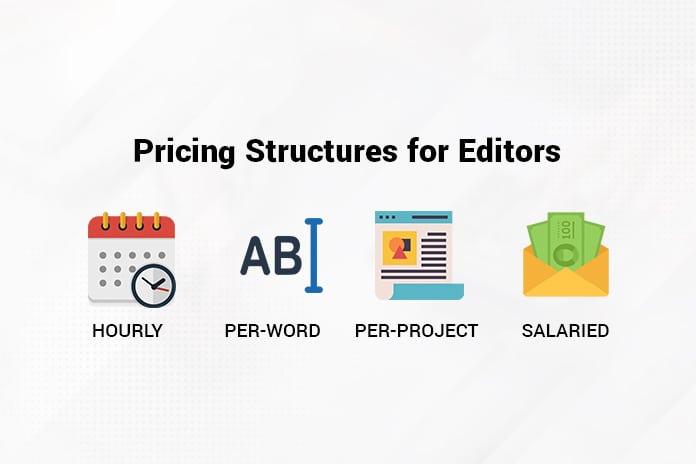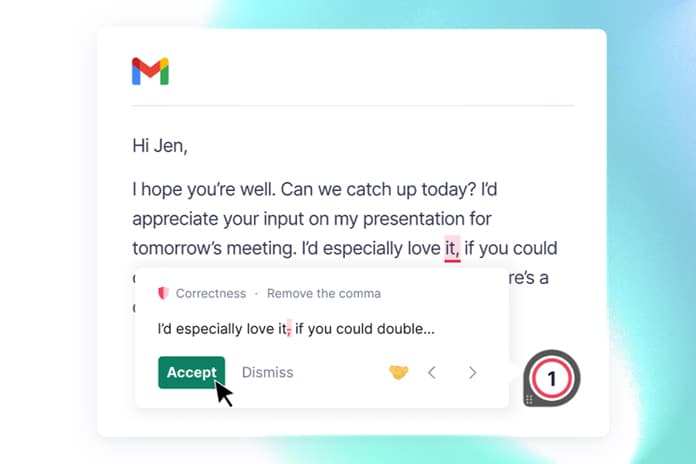Writers create the content that populates the web, web apps, software, wiki documentation, books in libraries around the world, and every piece of media on TV. They have a dirty secret, though. That secret? Most of them aren't really that great.
Oh, don't get us wrong. Writers are excellent for producing content. But content alone is never enough. That content needs to be polished to a shine, optimized for its purpose, and engineered to deliver exactly what it needs to, and nothing it doesn't.
Talk to any popular author, any blog owner, or any writer, and most of them will tell you the same thing. They just write things; it's the editors who make it sing.
It's clear, then, that if you're hiring writers to create content for you, you should also hire an editor to make that content better. The only question is, how much is it going to cost you?
 There are several tiers of editing, and different kinds of editing have different price points attached. Also, like writers, editors have different pricing models as well.
There are several tiers of editing, and different kinds of editing have different price points attached. Also, like writers, editors have different pricing models as well.Let's dig in and see what the business looks like.
In our FAQ about whether you should pay writers per-word or per-hour, we discussed several different pricing models writers use to sell their services. Per-word, per-hour, per-project, and salaried are all different ways of paying writers. What about editors?
Well, editors are in a similar boat.

There are generally four different possible pricing structures.
Additionally, there are three variables that can adjust the pricing your editors give you.
 Consistency. Some editors will offer discounts to clients that bring them regular work. Any freelancer is going to prize a source of regular, stable income and may offer a discount over their normal fee for consistent work (or simply keep your pricing stable when they raise rates elsewhere.) This may or may not happen and depends on the editor's volume of work.
Consistency. Some editors will offer discounts to clients that bring them regular work. Any freelancer is going to prize a source of regular, stable income and may offer a discount over their normal fee for consistent work (or simply keep your pricing stable when they raise rates elsewhere.) This may or may not happen and depends on the editor's volume of work.
 Volume Discounts. Some editors will offer discounts on their pricing for longer works or for larger volumes of work. This often goes hand-in-hand with tiered pricing, which we'll talk about more below.
Volume Discounts. Some editors will offer discounts on their pricing for longer works or for larger volumes of work. This often goes hand-in-hand with tiered pricing, which we'll talk about more below.
 Flat Fees. Many editors will have a flat fee on top of their per-word or per-page rates to guarantee a bare minimum amount of pay for even short projects. This, again, varies depending on the editor and the situation.
Flat Fees. Many editors will have a flat fee on top of their per-word or per-page rates to guarantee a bare minimum amount of pay for even short projects. This, again, varies depending on the editor and the situation.
More than just pricing structures, however, you have to consider the kind of editing your editor will be doing. There are quite a few different kinds of editing, so let's go through them.
Machine editing is what you get if you hire an extremely cheap editor. We're talking "I'll do your blog post for $5" cheap. Why? Well, they're basically just using automated tools, with a bare minimum of reading, and that's it.
Usually, these editors just crank up the settings on something like MSWord's grammar check or use a tool like Grammarly.

There's nothing wrong with this kind of editing, in general. Grammarly, Word, and other machine-based grammar checks often have issues, misinterpret common phrases, don't understand jargon, and they tend to strip personality and style from writing. But, on a technical level, they help fix typos, obvious grammatical errors, and even word choice issues.
The trouble here is that if you're paying someone to be a professional editor, they should be a professional editor for you. If they're just running your content through a tool you can easily access and use with the same proficiency, they aren't adding anything to the transaction.
Definitions vary on this kind of editing, but there are either two or three tiers here. For the sake of maximum granularity, we'll go over the various definitions.
 The first kind of editing is usually referred to as copyediting. It's a line-by-line, thorough, deep read-through of a piece of content. It looks for spelling errors, grammatical errors, typos, lost sentences, and other technical issues.
The first kind of editing is usually referred to as copyediting. It's a line-by-line, thorough, deep read-through of a piece of content. It looks for spelling errors, grammatical errors, typos, lost sentences, and other technical issues.
 The second kind of editing is often referred to as line editing. It's the same as copyediting, but it also involves reading the piece and looking for flow, continuity of ideas, logical layout, and structure. This is most often done with longer works and as part of editing a first draft.
The second kind of editing is often referred to as line editing. It's the same as copyediting, but it also involves reading the piece and looking for flow, continuity of ideas, logical layout, and structure. This is most often done with longer works and as part of editing a first draft.

The confusion here is that some people switch these terms; some refer to line editing as the technical overview and copyediting as the review with added attention to flow and structure. There's also a whole spectrum of service in between, and it often comes down to working with your editor to determine how much work they'll put into it.
 The third kind of editing may be referred to as proofreading or polishing. Unlike the above two, which apply to first drafts more than anything, this kind of editing is the final polishing pass before publication. Once the structural issues have been dealt with and the major premise is conveyed, 99% of the writing will be finalized. The remaining 1% is adjustments to language, tone, phrasing, and a final review for spelling and grammar.
The third kind of editing may be referred to as proofreading or polishing. Unlike the above two, which apply to first drafts more than anything, this kind of editing is the final polishing pass before publication. Once the structural issues have been dealt with and the major premise is conveyed, 99% of the writing will be finalized. The remaining 1% is adjustments to language, tone, phrasing, and a final review for spelling and grammar.
All of these are, more or less, similar services. As such, pricing tends to be similar for all of them. We've seen prices range anywhere from $5 per 1,000 words to $30+ per 1,000, depending on the depth, the length, the specialization of the subject, and the editor's experience.
A step above proofreading and line editing is content editing. Content editing is deeper and pays attention to the logical flow of ideas, the facts used to justify them, the validity of the logic, and more. A good content editor can even act as a professional fact-checker to validate the truth of statements. These kinds of editors tend to command a premium because they need to be at least subject matter experts or have very good ways of verifying facts themselves.

Content editing has some overlap with the more in-depth line editing previously mentioned. However, a good content editor may or may not even concern themselves with grammatical errors. Often, you hire them for their skill in structure, narrative focus, and rhetoric. They can turn a mediocre blog post into a compelling piece through use of structure and language.
As such, these editors can command a premium. That $30 per 1,000 words figure is a starting point, and you can see higher rates as well. Often, these kinds of editors charge per-project or hourly instead of per-word or per-page, with rates that range from $50 to $100 per hour.
Substantive editing is similar to the above, except they tend to operate more with narrative and fiction writing than they do with business or technical writing. They don't concern themselves much with spelling and grammar – at least not initially, they may do an overview while finalizing a project – but instead spend more time on the core of the narrative.
These are the people who read a book and point out when a character acts in a way counter to their personality, when dialogue just doesn't flow, or when a scene has problems. They're the people that turn manuscripts into books. They point out plot holes, flaws in plans, continuity errors, and all the rest.

You generally won't find substantive editors working for low rates. They're usually hourly and are paid by publishing houses to work with authors under contract. They don't have to worry much about per-word rates or hourly rates and instead just get paid a salary by their employer. Professional editors can pull in salaries from $50k to $100k per year, or even higher when they're well established.
Developmental editing is some of the most hands-on editing. In fiction writing, these editors work with the author from the very beginning, bouncing back and forth from outline to finished product. In business writing and blogging, these editors help guide content plans, do research into keywords and buyer personas, and generally do a lot of the groundwork to guide what the writer is writing in the first place. As such, sometimes they don't even qualify as editors.

Developmental editing starts at $55 per hour and goes up from there, depending on many factors, including the length and frequency of projects, the length of individual pieces of writing, and so on. It can be a salaried position, an hourly position, or a per-project position, but it is very rarely per-page or per-word. That's because per-page and per-word rates don't adequately reflect the amount of work that goes into a project outside of polishing the writing.
The truth is, editors operate on a sliding scale almost universally. The more experience they have, the better their skills, the better their foundational knowledge in a subject, and the more familiarity they have with you and your goals, the more they can charge and the deeper their editing can go.
Of course, rather than charge high rates exclusively and limit their client base, many editors offer tiered pricing. They will put out a chart that offers rates for copyediting, rates for more developmental or substantive editing, and rates for full-on project management. Then those rates may vary based on the length of the project, with flat rates for lower lengths and cheaper rates for much longer projects, depending on the editor.

All of this is to say that pricing varies a lot. There are also editors, like writers, who underestimate their own skill and subsequently undervalue their abilities. If you find one of those, and they prove themselves, offering them higher rates will ensure they're loyal to you for a long time.
Many of the people reading this site are business owners, entrepreneurs, or bloggers looking to hire someone to kick their content up a notch. As such, you either need a dedicated copyeditor to polish every piece of writing line-by-line, or you need a substantive editor to guide content strategy and work with you to create the best possible writing for your goals.

Really, it comes down to the skill gap in your existing organization. If you already handle content strategy and research, a copyeditor to polish your work is all you really need. If you want to mostly outsource your blogging, a content strategist may be more appropriate. Either way, you have a lot of options, and it comes down to finding a person you can work with for a fee you can pay.
Good editors make the content world go 'round. Without them, the written world would be a much less interesting place.
Do you have any questions about hiring a content editor, or how much you can expect them to charge for their services? If so, please be sure to leave a comment down below! We'd be more than happy to answer any of your questions and assist you however we can!
We encourage you to share this article on Twitter and Facebook. Just click those two links - you'll see why.
It's important to share the news to spread the truth. Most people won't.